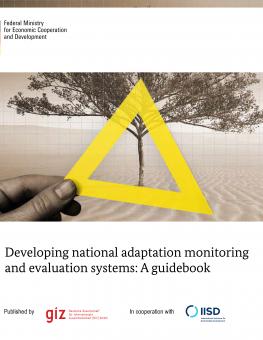
Developing national adaptation monitoring and evaluation systems: A guidebook
This guidebook is intended for decision makers and technical advisors involved in the development of national monitoring and evaluation (M&E) systems for adaptation, particularly in developing and middle-income countries.
Its objective is to guide decision making regarding the purpose, design, operationalization, and use of results of an appropriate system for national M&E of adaptation. Given its close linkages with the broader development and M&E context in a given country, the guidebook recognizes that there is no one-size-fits-all approach to national M&E of adaptation: Experience shows that decision makers in different countries have chosen very different approaches depending on the specific context.
This guidebook therefore leads the reader through a series of questions for consideration, responses to which will provide a basis for identifying practical steps towards the adoption of a national adaptation M&E system that best suits a given country. These questions for consideration are divided into four interrelated building blocks related to understanding the context of the M&E system, identifying the content to monitor, designing a process for operationalization, and deciding how to present results through products that will respond to the purpose of the M&E system.
Participating experts
You might also be interested in
Monitoring and Evaluating Adaptation at Aggregated Levels: A Comparative Analysis of Ten Systems
The paper Monitoring and Evaluating Adaptation at Aggregated Levels: A Comparative Analysis of Ten Systems provides an introduction to different approaches and experiences in designing and implementing (piloting) M&E systems for adaptation at the portfolio, national, regional and international levels.
COP 29 Outcome Moves Needle on Finance
In the last hours of negotiations, concerted pressure from the most vulnerable developing countries resulted in an improved outcome on the finance target, with a decision to set a goal of at least USD 300 billion per year by 2035 for developing countries to advance their climate action.
What Is the NAP Assessment at COP 29, and Why Does It Matter?
At the 29th UN Climate Change Conference (COP 29) in Baku, countries will assess their progress in formulating and implementing their National Adaptation Plans. IISD’s adaptation experts Orville Grey and Jeffrey Qi explain what that means, and what’s at stake.
IISD Annual Report 2023–2024
While IISD's reputation as a convenor, a trusted thought leader, and a go-to source on key issues within the sustainable development field is stronger than ever, the work happening outside the spotlight is just as valuable.